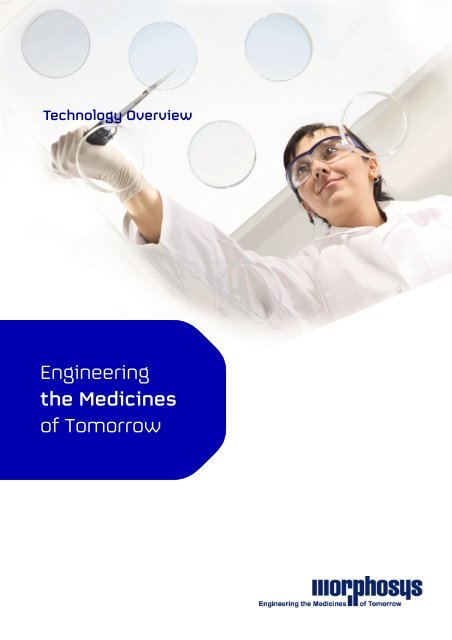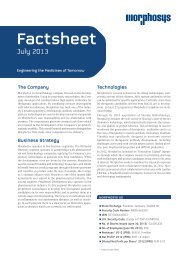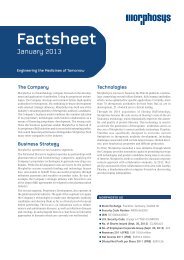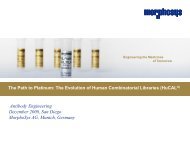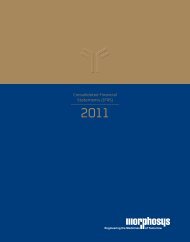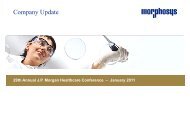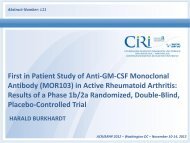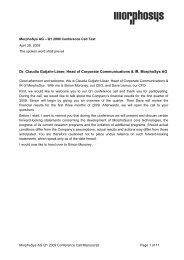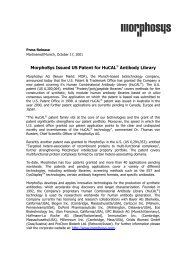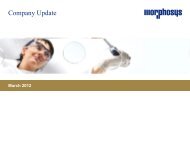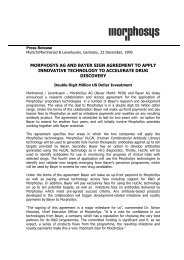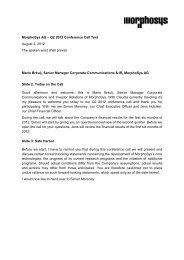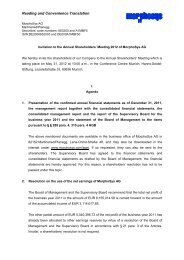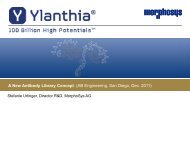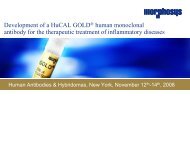MorphoSys's key technologies
MorphoSys's key technologies
MorphoSys's key technologies
Create successful ePaper yourself
Turn your PDF publications into a flip-book with our unique Google optimized e-Paper software.
Technology Overview<br />
Engineering<br />
the Medicines<br />
of Tomorrow
MorphoSys – July 2012
MorphoSys Key Technologies<br />
1. HuCAL<br />
MorphoSys’s HuCAL ®<br />
(Human Combinatorial Antibody Library) technology is a<br />
unique and innovative concept for the in vitro generation of highly specific and<br />
fully human antibodies. The Human Combinatorial Antibody Library is a<br />
collection of several billion distinct fully human antibodies that allows for the<br />
rapid selection of antibodies with high affinity and specificity. The recombinant<br />
antibody technology of HuCAL enables the generation of therapeutic and<br />
diagnostic antibodies, including those binding to difficult antigens.<br />
The HuCAL antibodies are produced in bacteria, and the technology enables in<br />
vitro selection to isolate antibodies with the desired characteristics. HuCAL is<br />
generated by de novo gene synthesis, and the large library is screened with a<br />
technique called phage display to identify the antibody with a high affinity to<br />
the investigated antigen.<br />
The structural diversity of the human antibody repertoire is 95 percent<br />
composed of seven heavy chain and seven light chain variable region genes. The<br />
combination of these genes gives rise to 49 frameworks in the HuCAL master<br />
library displaying several billion distinct fully human antibodies.<br />
MorphoSys – July 2012<br />
Technology Overview 3<br />
HuCAL is an antibody phage display library. Antibody fragments can be displayed on the bacteriophage surface. The modular gene<br />
structure of the antibodies allows a ‘plug-and-play’ approach to optimizing and engineering antibodies, which is restricted to the CDRs and<br />
thus does not compromise the germline configuration of the frameworks.<br />
Further fine-tuning of the antibodies is made possible with MorphoSys’s<br />
proprietary TRIM technology that facilitates the targeted diversification of CDRs.<br />
Pre-assembled trinucleotides are used in the chemical synthesis of the CDR<br />
sequences, thereby ensuring complete control over amino acid composition<br />
while avoiding stop codons. TRIM allows synthesizing any combination of<br />
amino acids at each single position of the variable region in a ratio reflecting<br />
exactly the one found in humans. As a result, these CDR libraries are of<br />
substantially higher quality than those developed using more conventional<br />
approaches.<br />
The HuCAL ® (Human<br />
Combinatorial Antibody<br />
Library) technology is a<br />
unique and innovative<br />
concept for the in vitro<br />
generation of highly<br />
specific and fully human<br />
antibodies.
4<br />
2. Ylanthia<br />
Ylanthia ®<br />
is MorphoSys’s next-generation antibody technology and was<br />
presented in December 2011. Ylanthia, which is the industry’s largest antibody<br />
Fab library to date, uses a unique and innovative concept for the in vitro<br />
generation of highly specific and fully human antibodies. MorphoSys expects its<br />
novel antibody library to set new standards for therapeutic antibody generation<br />
in the pharmaceutical industry over the next decade and beyond.<br />
YLANTHIA – MOVING BEYOND HUCAL<br />
Ylanthia‘s genetic design captures the best of three worlds<br />
DRUG CANDIDATES WITH SUPERIOR PROPERTIES AGAINST UNIQUE<br />
TARGETS AND EPITOPES<br />
Ylanthia takes antibody technology beyond current methods. There are two<br />
major reasons why existing <strong>technologies</strong> limit the successful development of<br />
therapeutic antibodies. First, many antibodies fail in development due to poor<br />
biophysical properties, which render the molecule “not developable”. If the<br />
antibody cannot be manufactured or its properties make it difficult to handle,<br />
chances of successful commercialization are slim. Second, failure to generate<br />
antibodies against all regions or “epitopes” of a target may lead to highly<br />
promising disease targets being overlooked. Lack of diversity in antibody<br />
generation means that putative targets often are not fully “interrogated” with<br />
antibodies intended to probe their role in disease processes. The Ylanthia<br />
technology was specifically conceived and designed to overcome these<br />
limitations.<br />
Ylanthia, which is the<br />
industry’s largest<br />
antibody Fab library to<br />
date, uses a unique and<br />
innovative concept for the<br />
in vitro generation of<br />
highly specific and fully<br />
human antibodies.
Ylanthia − Quality in Design:<br />
Payoff in Timelines and Success Rates<br />
YLANTHIA AT A GLANCE<br />
� Size and heavy/light chain pairing: Ylanthia is the industry’s<br />
largest known antibody Fab library, comprising over 100 billion<br />
distinct, fully human antibodies. Ylanthia uses 36 fixed, naturallyoccurring<br />
heavy and light chain framework combinations, which<br />
translates into unprecedented structural diversity. Great care was<br />
invested into the antigen binding site design. The library’s<br />
diversity is expected to result in antibodies against previously<br />
inaccessible target molecules and unique epitope coverage.<br />
� Biophysical properties: Antibody frameworks were pre-selected for<br />
expression levels, stability and aggregation behavior. A shift<br />
towards higher stability and stress tolerance will increase shelf life<br />
and serum stability of resulting antibody-products, making them<br />
more cost-effective to produce and administer. A higher solubility<br />
in turn opens up the path for more convenient formulations for<br />
patients, such as subcutaneous administration.<br />
MorphoSys – July 2012<br />
Technology Overview 5
6<br />
� Optimization: When needed, antibodies from the Ylanthia library<br />
are optimized using MorphoSys’s proprietary Slonomics ®<br />
technology, which MorphoSys obtained through its 2010<br />
acquisition of Sloning BioTechnology. Ylanthia thereby<br />
distinguishes itself in a central respect from HuCAL, which relies<br />
on a modular gene design and pre-formed cassettes for antibody<br />
optimization. Slonomics enables optimization of Ylanthia<br />
antibodies with unprecedented speed and flexibility.
3. arYla − Antibodies Tailored to Match<br />
Your Needs<br />
arYla ®<br />
is Slonomics applied to antibodies, a novel antibody optimization<br />
platform providing high quality, ratio-controlled combinatorial libraries. arYla<br />
offers an individualized maturation solution for antibodies. With the arYla<br />
technology, MorphoSys combines more than 15 years of experience in design<br />
and selection of therapeutic antibodies with the unique library synthesis<br />
capabilities acquired with Sloning in October 2010.<br />
FULL FLEXIBILITY IN ANTIBODY LIBRARY DESIGN<br />
arYla brings significant advantages to antibody optimization especially in terms<br />
of speed and flexibility. The new technology enables individualized antibody<br />
libraries to be made with unprecedented speed and precision.<br />
MorphoSys – July 2012<br />
Technology Overview 7<br />
arYla ® is Slonomics<br />
applied to antibodies,<br />
a novel antibody<br />
optimization platform<br />
providing high quality,<br />
ratio-controlled<br />
combinatorial libraries.
8<br />
CUSTOMIZED YLANTHIA ANTIBODY OPTIMIZATIONS<br />
The arYla technology uses a unique DNA engineering platform (Slonomics ®<br />
) to<br />
precisely introduce the desired mutations through the production of high quality,<br />
genetically diverse, customized variant libraries of the existing compound.<br />
arYla can be used to make diverse, customized sub-libraries based on an<br />
existing lead compound, incorporating many millions of pre-defined variations<br />
at precisely determined sites within the antibody structure. In this way,<br />
antibodies optimized for a multitude of properties including affinity, specificity,<br />
immunogenicity, solubility, stability, production yield and others can rapidly be<br />
identified.
4. SLONOMICS<br />
In October 2010, Sloning BioTechnology GmbH joined the MorphoSys Group.<br />
The transaction made MorphoSys the sole source of Sloning's state-of-the-art<br />
Slonomics ®<br />
technology.<br />
Sloning’s superior combinatorial libraries are unbiased and enable researchers<br />
to increase the success rate of their screening for new and optimized therapeutic<br />
antibodies, proteins or industrial enzymes.<br />
Key to Sloning’s success is the company’s core technology, Slonomics, a<br />
proprietary, fully automated genetic engineering platform that utilizes sets of<br />
double stranded DNA triplets in the controlled fabrication of highly diverse<br />
combinatorial gene libraries.<br />
SLONOMICS: TRIPLET-BASED SYNTHESIS OF DNA LIBRARIES<br />
MorphoSys – July 2012<br />
Technology Overview 9<br />
Sloning’s superior<br />
combinatorial libraries are<br />
unbiased and enable<br />
researchers to increase<br />
the success rate of their<br />
screening for new and<br />
optimized therapeutic<br />
antibodies, proteins or<br />
industrial enzymes.
10<br />
5. First-Class Automation Using YScreen<br />
YScreen is a system of laboratory robots and software that facilitates the highthroughput<br />
screening of HuCAL antibody libraries resulting in the rapid<br />
selection of a highly diverse pool of specifically binding antibody fragments.<br />
FEATURES:<br />
� High-throughput automated system<br />
� Modular and expandable<br />
� Reduced reaction volumes in 384 well microtiter plates lead to less<br />
consumption of antigens and consumables<br />
� Inline quality control by integrated controls<br />
� Extremely low intra- and inter-assay variability<br />
� Efficient data management<br />
� Output: Specific monoclonal ELISA binders<br />
In order to automate and increase the throughput in antibody generation, the<br />
selection process of HuCAL antibodies was simplified, miniaturized and<br />
parallelized. The automated system allows the generation of high-quality,<br />
validated and sequenced antibodies in a high throughput fashion. The modular<br />
system of specialized workstations enables parallel and interlaced handling of<br />
work packages. An up-scale of capacity is easily attainable by “cloning” the<br />
robotic system or individual components thereof.<br />
AUTOSCREEN ®<br />
SCREENING STEPS<br />
� Automated picking of single bacterial colonies each harbouring a<br />
HuCAL antibody gene and transfer into microtiter plates<br />
� Primary screening of thousands of single clones in a robust 384 well<br />
ELISA<br />
� Automated transfer of a pre-defined selection of ELISA-positive clones<br />
for further validation<br />
� Test of cross-reactivity and quality control of ELISA-positive clones<br />
� Sequence analysis of validated antibodies and database entry<br />
YCLONE: POLYCLONAL IGG CONVERSION<br />
� Polyclonal conversion of >100 Fabs into IgG format within 3 weeks<br />
� 80% recovery of input sequences<br />
� Heavy and light chain in one vector: pYMex<br />
� Tremendous increase in number of IgG conversions<br />
� Highly effective workflow compatible with different IgG expression<br />
scales<br />
� Functional screening of full length IgGs early on in the project
MorphoSys’s Product Pipeline (07/2012)<br />
HuCAL ®<br />
, HuCAL GOLD ®<br />
, HuCAL PLATINUM ®<br />
, CysDisplay ®<br />
, RapMAT ®<br />
, arYla ®<br />
, Ylanthia ®<br />
and 100 billion high potentials ®<br />
are registered trademarks of MorphoSys AG.<br />
Slonomics ®<br />
is a registered trademark of Sloning BioTechnology GmbH, a subsidiary of MorphoSys AG.<br />
MorphoSys – July 2012<br />
11
MorphoSys AG<br />
Business Development<br />
Lena-Christ-Str. 48<br />
82152 Martinsried/Planegg<br />
Germany<br />
Phone: +49(0)89/89927-453<br />
Fax: +49(0)89/89927-5453<br />
Email: bd@morphosys.com<br />
www.morphosys.com


